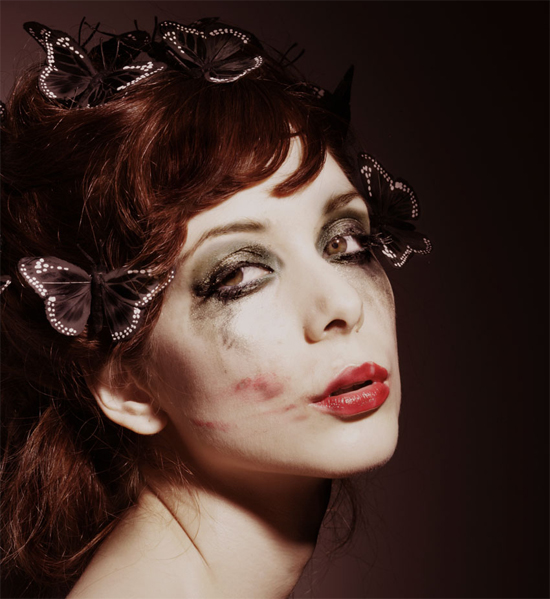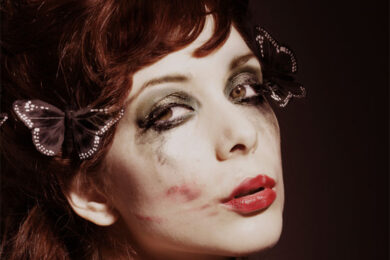As we look forward to a train ride to Latitude tomorrow, The Quietus disturbs Catherine AD "gazing at the rain, humming some Garbage" as we put her through the Escape Velocity pre-flight countdown. Catherine (the AD part stands for Anne Davies) is one of those artists who are sadly slim on the ground these days – instead of blethering loudly about her eccentric brilliance, she quietly gets on with it, be that as artist in residence at the South Bank Centre, collaborating with Bernard Butler, or devoting hours to hand-crafting all the packaging for her own records.
Can you tell us a little about what you’ve been up to lately?
Nothing and a lot. I’ve sort of been touring churches. I played in a church at the Great Escape, then at the Union Chapel last month with David Gilmour and Amadou & Mariam. I’ve also been putting together a Remix EP that kind of came about accidentally from someone remixing the wrong track and then I thought "what the hell" and went with the idea. I’ve also been vying for the record of the shortest journalistic career in history ever after I got to interview Nicky Wire for DrownedInSound and decided there was no way to top that. What else have I been up to? Well, you can often hear me emitting a low pitched scream in the early hours at the Strongrooms studios in east London where I’ve been putting some finishing touches to a few of the album tracks and engaging in some mammoth mixing sessions with 27 double tracked vocals…
You are a Catherine AD. Is there a Catherine BC, and what would she sound like?
Me BC, I was dancing around to music in my parents’ lounge, bouncing off cushions with my t-shirts in knots pretending to be Kylie. But Catherine BC, now, would probably be composing contemporary classical electronic landscapes for the ballet Rambert.
How do you feel your music has evolved? Did you start off with quite sparse songs and then build upon them?
I think at the start I was quite reticent to address some of the reasons why I was writing and that’s reflected in the shyness of the music, sonically speaking. I wasn’t very sure of my voice or that I even wanted people to hear what I was doing. I’m a bit embarrassed about some of the old stuff, especially now that I’m up to about a hundred songs or more . . . you learn a lot through writing and hopefully it’s always a gradient of improvement. Some of the songs that will end up on the [debut] album are actually quite old, like ‘Hand to The Tide’ that started out as a piano piece but I’ve revisited a few of the ones that refused to be buried and insisted I come back to them as I’ve had access to better recording facilities or orchestras/omnichords etc. I guess you could say in some ways that my writing has responded to the means and methods of recording – I’ve been able to realise some of the grander ideas in my head where as before I was restricted to guitar and piano and vocal competing against the sound of the traffic on Edgware Road, when I was recording in my bedroom. Plus recently I’ve had the opportunity to score things for the London Philharmonic (for a special show I did at the Royal Festival Hall) which is obviously a whole new world of possibility. Of course, I’ve been teaching myself to play a lot of the instruments at the same time too so that’s had an influence on how I write and the arrangements have been able to evolve because of that.
You’ve always had a real attention to detail with your music, down to making your own packaging. Why has that been important to you?
I really like things like the Constellation label releases where you feel like the packaging is an extension of the music. For me, making music is part and parcel of a complete idea that lives in my head and the way that it looks is part of that in terms of delivering another world to the people listening. Even if it does mean I give myself RSI from tying all the ribbons myself… I really care about the thing as a whole.
What was it like working with Bernard Butler? What did he bring to what you do?
At first I was quite reticent – I’d not collaborated with anyone before on my own stuff and Bernard is such a phenomenal musician that it can be quite intimidating to put yourself in that position but we sort of worked with that and I pushed myself into places where perhaps I wouldn’t have gone before – stepping away from the instruments and exploring my voice in different ways. He was really great in that he seemed to have a real intuitive understanding of how to get the best out of you so that you are changing your creative habits. It was both terrifying and exhilarating at the same time. We did work at an incredible pace – I think we ended up with three songs in the first two days and five songs over the course of the sessions, although I’m not sure how many will end up being heard. The first time I picked up a guitar in front of him was quite a scary moment but it was a bit like ripping a plaster off – you have to get it over and done with quickly…
Please name three non-musical influences:
EE Cummings, Matthew Barney and Ariel, the little mermaid.
What was a formative musical moment in the life of Catherine AD?
It would have to be hearing In Utero or the song ‘Faster’ by the Manics. We used to steal CDs from a friend’s older sister who we thought was really cool because she was allowed to go to gigs in London. They were such strange sounds that my ears weren’t used to yet (I was obsessed by the chorus to ‘Scentless Apprentice’) but I was utterly compelled to hear more and became pretty obsessed by music from there on in. I think the visceral nature of both those records really appealed to the dancer in me (which was the bulk of my musical experience at that time, mostly classical stuff and my parents’ Carpenters records). In a way I was primed to be drawn to all these loud post-punk scrawlings because music like that is such a physical experience – you feel through your whole body. I still react to music in the same way – I love it when it makes you feel nauseated or overwhelmed or you can feel it pulse through your skull. That’s the kind of place I like to go to when I’m on stage…
Do you feel that women in music today often have to rely on gimmicks and a false eccentricity to get attention? If so, how do you react to that?
I think both male and female musicians can be equally guilty of relying on gimmicks but I think it’s also important to remember that there is a fine line between showmanship and performance and gimmickry. I think in terms of women making music it’s perhaps the press that cast it that way (rather than the artists themselves) as it’s a motif people are familiar with – "the new Kate Bush etc." which is easy to fall back on. I don’t know what the answer is . . . Throughout history, creativity (especially female) has been coupled with this idea of madness (there’s this great book called Touched With Fire about it the artistic temperament and mental instability) which has now been diluted down to a kind of ‘kookiness’ that has been adopted by some people as a ‘style’, like choosing to put on a certain colour dress one day. As for false eccentricity, I think there are some female musicians that are genuinely a little odd because, frankly, you must be a little unhinged to put yourself out there in an industry such as this. I’ll leave that for others to judge though, I mean it’s also dangerous if we start demanding ‘authentic’ madness from our artists, although I think it was Byron who said "we of the craft are all crazy."
You’re an emerging artist in residence at the South Bank Centre. How did that come about, what has it involved, and how has the experience been for you?
Yes, I recently finished my residency there which was a great opportunity that came about through some composition work I did with Nitin Sawhney for the reopening of the Royal Festival Hall. I got to do some really cool things like work with the orchestra in residence and collaborated with Riz MC on a piece called ‘Sour Times’ that is currently ‘enjoying’ repeated plays on Al Jazeera (true story). I also got to play in some amazing spaces like the Queen Elizabeth Hall and the main Royal Festival Hall space. They have some seriously good acoustics in there and a hell of a good collection of Steinway & Boesendorfer pianos. It was like piano porn central in there.
So, you’re playing Latitude. What are you most looking forward to about the festival?
It’s my first festival performance so I am looking forward to the thrill and the danger of no soundcheck! (gulp) Apparently we also get to travel by boat to get to the stage though. The fact that I’m playing on a stage in a woods intrigues me. Will we be powered by woodpeckers?
We noticed Nick Cave & The Bad Seeds are in your top chums on MySpace. What is it that you like most about Mr Cave and his merry men?
Anyone who can crowbar the word "Prolix!" into a pop song is all right by me. I shall be attempting to stalk him at Latitude.
What was your first festival?
Reading. Mud. Collapsed tent. Too much cider. Stage diving. Kidney infection.
And best and worst memory of a festival?
The best one is probably unprintable . . . but I went to Coachella last year and saw The National there as the sun set in the desert. Worst? Reading 2007. I spent the entire time in tears and probably should have given it a miss.
What is a just punishment for the sort of otherwise sane people who turn up at festivals with jester hats and a set of juggling implements?
I think photographic evidence that haunts them in years to come is punishment enough.
Please complete: In one year’s time I will be . . .
. . . in technicolor and Dolby surround sound.



